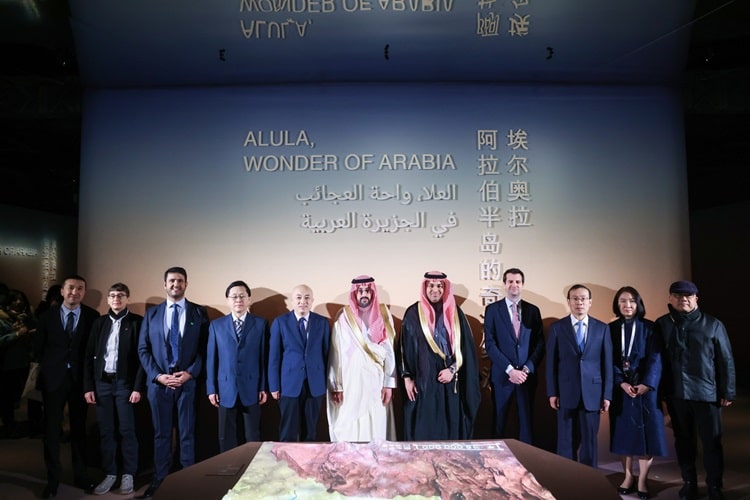236 rare cultural artefacts and historical relics from AlUla in northwest Saudi Arabia displayed at Palace Museum
Taking place from 6th of January until 22nd of March, the exhibition will take visitors on a unique and rich journey of cultural discovery
Beijing, China – -:
The ‘AlUla, Wonder of Arabia’ exhibition held its grand opening ceremony today at the Meridian Gate – West Wing in the Palace Museum, at Beijing’s UNESCO World Heritage Site, the Forbidden City.
Promising a journey like no other through AlUla’s 7,000 years of successive civilisations and 200,000 years of shared human history, the exhibition is a collaboration between the Royal Commission for AlUla (RCU), the Palace Museum and the French Agency for AlUla Development (AFALULA). It features hundreds of exciting artefacts on display, some for the very first time.
Previously held at the Arab World Institute in Paris from October 2019 to March 2020, this new edition of ‘AlUla, Wonder of Arabia’ was curated by archaeologists Dr. Laïla Nehmé, Senior Research Fellow at CNRS, and Dr. Abdulrahman Alsuhaibani, Executive Director of Archaeology, Conservation and Collections at RCU.
Dr. Alsuhaibani explained that in its second edition, this exhibition will not only display AlUla’s spectacular natural scenery, rare archaeological artefacts, and its rich cultural heritage, but notably among the 236 exhibits, around 50 items have never been displayed before. This extraordinary, multilayered showcase will take the Palace Museum’s visitors on an epic journey through the history and legacy of AlUla, unveiling recently excavated cultural relics and ancient animal bones from ‘mustatils’ dating to the prehistoric era that have contributed to a better understanding of that era.
Apart from the newly exhibited artefacts, the exhibition showcases various rare sculptures, pottery, rock paintings, inscriptions, bronze relics, immersive multimedia, and works by renowned photographer Yann Arthus-Bertrand, presenting the spectacular natural beauty and rich cultural heritage of AlUla.
Through the expertly curated chronological layout of the exhibition, visitors can seamlessly explore the geographical intricacies and environmental settings that facilitated the earliest human settlements in AlUla. Visitors move from one space to another, following a chronological and thematic layout, with stops at the four main heritage sites in the AlUla Valley: Dadan, Hegra, Qurh, and Old Town, exploring in each stop many secrets on the ancient civilisations that inhabited these sites through time.
The Dadan ruins have revealed a large number of crafted sculptures and artworks, and visitors can witness the prosperity of the Dadan and Lihayanite dynasties through these works. The UNESCO World Heritage Site Hegra is an ancient city renowned for its stone-carved facades of tombs and well-preserved funerary monuments.
The exhibition also serves as a reminder of the legacy of trade that once connected the Arabian Peninsula with China. AlUla lies along the ancient Incense Road and later routes of pilgrimage to Makkah, and its historical significance as a trading hub evident from the myriad of caravans that traversed the landscape. These routes enabled the transport of Chinese silk and ceramics to the Arabian Peninsula, and Arabian frankincense amongst other precious goods, to China. Subsequently, AlUla emerged as a crucial hub where traders, pilgrims and travellers converged, leaving behind a mosaic of cultural and commercial exchange.
Abdulrahman Altrairi, Chief of Communications and PR, of the Royal Commission for AlUla, said: “AlUla, a brilliant cultural gem in the northwest of Saudi Arabia, has historically been a convergence point for various civilisations. The development of AlUla is now an important part of Saudi Arabia’s Vision 2030 plan. We are delighted to present AlUla’s enduring historical and cultural treasures to a Chinese audience. This exhibit will enhance AlUla’s international prominence, solidify its status as a home to a rich history and cultural heritage, and lay the foundations for enhanced exchanges between China and Saudi Arabia in archaeology, culture, tourism, and the arts.”
Lou Wei, Executive Vice President of the Palace Museum said: “China and the Kingdom of Saudi Arabia are situated on opposite ends of the Asian continent. Historically, it was the joint efforts and participation of people from East and West Asia that created the Silk Road, connecting numerous countries and regions in Asia, Africa, and Europe, thereby fostering cultural exchanges across a vast area. The Palace Museum has long aimed to use cultural relics that showcase history and outstanding ancient cultures, to promote mutual understanding and exchanges between different civilisations. Hosting the ‘AlUla, Wonder of Arabia’ exhibition will further deepen cultural exchanges and cooperation between China and foreign cultures, making a significant contribution to promoting people-to-people connectivity along the Belt and Road Initiative and building a community with a shared future for humanity.”
Simond de Galbert, First secretary of the French Embassy in China, said: “By choosing for its exhibition the Forbidden City, one of the most visited UNESCO World Heritage sites, AlUla confirms once again its ambition to share with an international audience the vast extent of its dazzling heritage. China’s hosting of ‘AlUla, Wonder of Arabia’ is a new and prestigious launch pad for the exhibition’s journey to the rest of the world.’
The opening ceremony was held in the presence of H.E Abdulrahman Alharbi, the Saudi ambassador to China, H.E Hussain bin Ibrahim Alhammadi, the UAE ambassador to China, with representatives from the Qatar, Bahrain, Kuwait and French embassies, the Royal Commission for AlUla (RCU), the Palace Museum, the French Agency for AlUla Development (AFALULA), along with media representatives and guests from the fields of archaeology, art, culture, and nature.
AlUla is a ‘living museum’ blending nature, history, and culture. It has gained increasing attention in recent years as an emerging tourist hotspot. Welcoming visitors since 2020, AlUla is driven by modernity whilst remaining rooted in its ancient culture and staying true to its rich heritage. AlUla offers a range of luxury accommodation, dining and retail as well as stunning heritage sites, landscapes and adventure and wellness activities. Saudi Arabia was granted Approved Destination Status (ADS) by China in September 2023, which provides numerous conveniences for Chinese tourists visiting the Kingdom and lays a solid foundation for more visitors to explore AlUla.
Visitors to Beijing’s Forbidden City can attend ‘AlUla: Wonder of Arabia’ exhibition from 6th of January until 22nd of March, 2024 at the Palace Museum. Interested audiences are invited to visit the website at www.dpm.org.cn for more information and to make a reservation.




